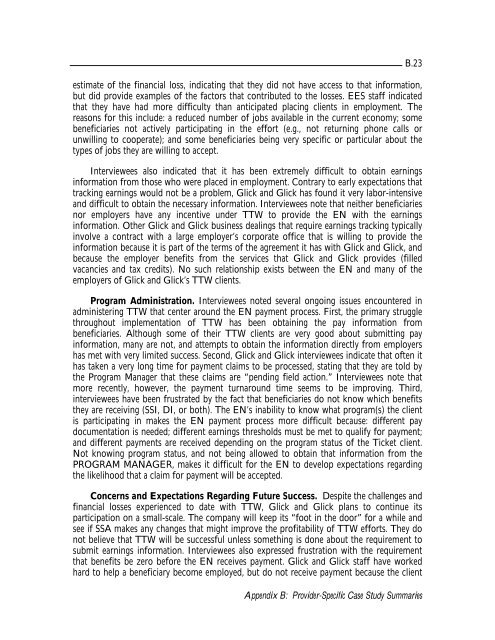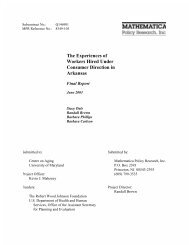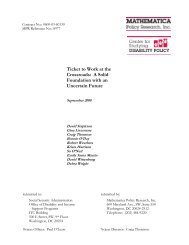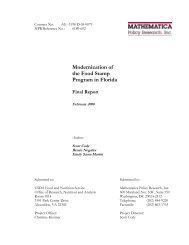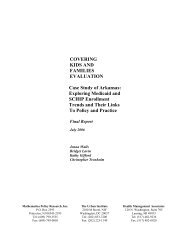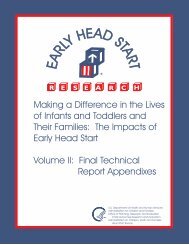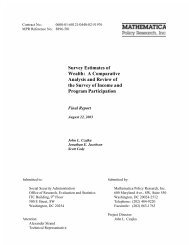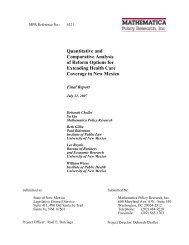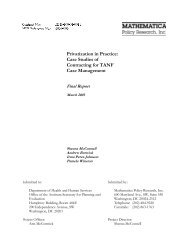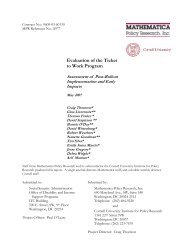Evaluation of the Ticket to Work Program Initial Evaluation Report
Evaluation of the Ticket to Work Program Initial Evaluation Report
Evaluation of the Ticket to Work Program Initial Evaluation Report
Create successful ePaper yourself
Turn your PDF publications into a flip-book with our unique Google optimized e-Paper software.
B.23<br />
estimate <strong>of</strong> <strong>the</strong> financial loss, indicating that <strong>the</strong>y did not have access <strong>to</strong> that information,<br />
but did provide examples <strong>of</strong> <strong>the</strong> fac<strong>to</strong>rs that contributed <strong>to</strong> <strong>the</strong> losses. EES staff indicated<br />
that <strong>the</strong>y have had more difficulty than anticipated placing clients in employment. The<br />
reasons for this include: a reduced number <strong>of</strong> jobs available in <strong>the</strong> current economy; some<br />
beneficiaries not actively participating in <strong>the</strong> effort (e.g., not returning phone calls or<br />
unwilling <strong>to</strong> cooperate); and some beneficiaries being very specific or particular about <strong>the</strong><br />
types <strong>of</strong> jobs <strong>the</strong>y are willing <strong>to</strong> accept.<br />
Interviewees also indicated that it has been extremely difficult <strong>to</strong> obtain earnings<br />
information from those who were placed in employment. Contrary <strong>to</strong> early expectations that<br />
tracking earnings would not be a problem, Glick and Glick has found it very labor-intensive<br />
and difficult <strong>to</strong> obtain <strong>the</strong> necessary information. Interviewees note that nei<strong>the</strong>r beneficiaries<br />
nor employers have any incentive under TTW <strong>to</strong> provide <strong>the</strong> EN with <strong>the</strong> earnings<br />
information. O<strong>the</strong>r Glick and Glick business dealings that require earnings tracking typically<br />
involve a contract with a large employer’s corporate <strong>of</strong>fice that is willing <strong>to</strong> provide <strong>the</strong><br />
information because it is part <strong>of</strong> <strong>the</strong> terms <strong>of</strong> <strong>the</strong> agreement it has with Glick and Glick, and<br />
because <strong>the</strong> employer benefits from <strong>the</strong> services that Glick and Glick provides (filled<br />
vacancies and tax credits). No such relationship exists between <strong>the</strong> EN and many <strong>of</strong> <strong>the</strong><br />
employers <strong>of</strong> Glick and Glick’s TTW clients.<br />
<strong>Program</strong> Administration. Interviewees noted several ongoing issues encountered in<br />
administering TTW that center around <strong>the</strong> EN payment process. First, <strong>the</strong> primary struggle<br />
throughout implementation <strong>of</strong> TTW has been obtaining <strong>the</strong> pay information from<br />
beneficiaries. Although some <strong>of</strong> <strong>the</strong>ir TTW clients are very good about submitting pay<br />
information, many are not, and attempts <strong>to</strong> obtain <strong>the</strong> information directly from employers<br />
has met with very limited success. Second, Glick and Glick interviewees indicate that <strong>of</strong>ten it<br />
has taken a very long time for payment claims <strong>to</strong> be processed, stating that <strong>the</strong>y are <strong>to</strong>ld by<br />
<strong>the</strong> <strong>Program</strong> Manager that <strong>the</strong>se claims are “pending field action.” Interviewees note that<br />
more recently, however, <strong>the</strong> payment turnaround time seems <strong>to</strong> be improving. Third,<br />
interviewees have been frustrated by <strong>the</strong> fact that beneficiaries do not know which benefits<br />
<strong>the</strong>y are receiving (SSI, DI, or both). The EN’s inability <strong>to</strong> know what program(s) <strong>the</strong> client<br />
is participating in makes <strong>the</strong> EN payment process more difficult because: different pay<br />
documentation is needed; different earnings thresholds must be met <strong>to</strong> qualify for payment;<br />
and different payments are received depending on <strong>the</strong> program status <strong>of</strong> <strong>the</strong> <strong>Ticket</strong> client.<br />
Not knowing program status, and not being allowed <strong>to</strong> obtain that information from <strong>the</strong><br />
PROGRAM MANAGER, makes it difficult for <strong>the</strong> EN <strong>to</strong> develop expectations regarding<br />
<strong>the</strong> likelihood that a claim for payment will be accepted.<br />
Concerns and Expectations Regarding Future Success. Despite <strong>the</strong> challenges and<br />
financial losses experienced <strong>to</strong> date with TTW, Glick and Glick plans <strong>to</strong> continue its<br />
participation on a small-scale. The company will keep its “foot in <strong>the</strong> door” for a while and<br />
see if SSA makes any changes that might improve <strong>the</strong> pr<strong>of</strong>itability <strong>of</strong> TTW efforts. They do<br />
not believe that TTW will be successful unless something is done about <strong>the</strong> requirement <strong>to</strong><br />
submit earnings information. Interviewees also expressed frustration with <strong>the</strong> requirement<br />
that benefits be zero before <strong>the</strong> EN receives payment. Glick and Glick staff have worked<br />
hard <strong>to</strong> help a beneficiary become employed, but do not receive payment because <strong>the</strong> client<br />
Appendix B: Provider-Specific Case Study Summaries


